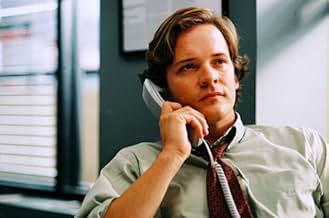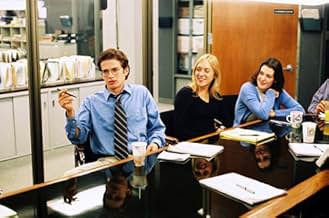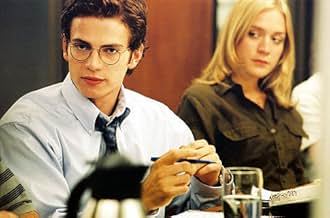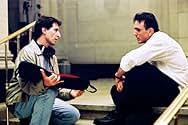La historia de un joven periodista que cayó en desgracia al ser descubierto que se inventó más de la mitad de sus artículos en la publicación The New Republic.La historia de un joven periodista que cayó en desgracia al ser descubierto que se inventó más de la mitad de sus artículos en la publicación The New Republic.La historia de un joven periodista que cayó en desgracia al ser descubierto que se inventó más de la mitad de sus artículos en la publicación The New Republic.
- Premios
- 11 premios ganados y 28 nominaciones en total
Owen Roth
- Ian Restil
- (as Owen Rotharmel)
- Dirección
- Guionistas
- Todo el elenco y el equipo
- Producción, taquilla y más en IMDbPro
Opiniones destacadas
The New Republic is one of many political comment magazines published out of Washington DC. The writing/editing staff is small and young and includes the humble and friendly Stephen Glass. His stories are often very interesting and outrageous and he starts to attract attention from other magazines for contributions. When writes about an on-line hacker who attacked the website of a large software company he attracts the attention of an internet-based journal and writer Adam Penenberg who gets attacked by his editor for missing the story. However, as Penenberg starts to look at the facts behind the story he starts to suspect that the story is one large fabrication.
I only vaguely remember the original breaking of this story and am not aware of the full facts behind the story but I was interested enough to go and see this film when it was released at the weekend. The film opens with Glass giving a talk to a class back at his old school where he learnt his trade, this is then used as a tool to give background on both him and the job he does. This works pretty well even if it is a little confusing as to when it is happening (a fact not understood until the end). The main thrust of the film is the gradual exposure of the lies that Glass has been perpetrated within his stories. In this regard it works pretty well as a drama with a good story made all the more interesting and engaging by being true. It never really ignites into being a thriller and it misses a few opportunities to really be gripping but it still performs well as a good solid film perhaps it was a decision not to stick in more shouting or acting fireworks, it was the right decision but I'm sure some audiences will expect shouting and fireworks.
The one moment I did feel that the film missed out was where Chuck picks several editions off the shelf and starts to realize the extent of the lies that they have been publishing: that scene wasn't dramatic and it wasn't convincing, that should have been a lot more dramatic but this is only one scene in the whole film. Like I said, some people will find this film a bit slow and lacking in pace but for me it was the story that drove the film as opposed to theatrical tricks. The cast help the film a great deal, even if many of them are barely more than cameos. Christensen's performance worried me at the start because it seemed to be a bit cheesy but after 15 minutes I realized that this was the point. His Glass is manipulative and deceitful to the point where it is an act that he delivers naturally it was a difficult character to do and, despite him not being showy, he gets it bang on and he delivers the same character throughout while just allowing the audience's perception of him to change. Sarsgaard actually turns out to have the lion's share of the film and he gets the showiest moments of shouting he is good and acts as our eyes. Sevingy is a real good actress and does well with her few scenes. The rest of the cast is well padded with famous faces who all deliver well with the little they have. Azaria is good and is given a good character (who died in real life covering the war in Iraq), Zahn manages to not be an annoying pr*ck a feat in itself, but Dawson's presence was a mystery to me. She has very little to do other that be pretty and show the pressure in her job, but he is barely more than a cameo.
Overall this film lacks fireworks and bases it's slow pace on the facts of the true story and not hammy acting or directing flourishes. In this regard the film is enjoyable if a little slow. It squanders a few changes to make more of an impact but generally it delivers a true story in a manner that is straight but well told. A great cast aren't all used well but are good where it matters while also adding depth. Not the film that Saturday night crowds will be hoping for but a good story well told nonetheless.
I only vaguely remember the original breaking of this story and am not aware of the full facts behind the story but I was interested enough to go and see this film when it was released at the weekend. The film opens with Glass giving a talk to a class back at his old school where he learnt his trade, this is then used as a tool to give background on both him and the job he does. This works pretty well even if it is a little confusing as to when it is happening (a fact not understood until the end). The main thrust of the film is the gradual exposure of the lies that Glass has been perpetrated within his stories. In this regard it works pretty well as a drama with a good story made all the more interesting and engaging by being true. It never really ignites into being a thriller and it misses a few opportunities to really be gripping but it still performs well as a good solid film perhaps it was a decision not to stick in more shouting or acting fireworks, it was the right decision but I'm sure some audiences will expect shouting and fireworks.
The one moment I did feel that the film missed out was where Chuck picks several editions off the shelf and starts to realize the extent of the lies that they have been publishing: that scene wasn't dramatic and it wasn't convincing, that should have been a lot more dramatic but this is only one scene in the whole film. Like I said, some people will find this film a bit slow and lacking in pace but for me it was the story that drove the film as opposed to theatrical tricks. The cast help the film a great deal, even if many of them are barely more than cameos. Christensen's performance worried me at the start because it seemed to be a bit cheesy but after 15 minutes I realized that this was the point. His Glass is manipulative and deceitful to the point where it is an act that he delivers naturally it was a difficult character to do and, despite him not being showy, he gets it bang on and he delivers the same character throughout while just allowing the audience's perception of him to change. Sarsgaard actually turns out to have the lion's share of the film and he gets the showiest moments of shouting he is good and acts as our eyes. Sevingy is a real good actress and does well with her few scenes. The rest of the cast is well padded with famous faces who all deliver well with the little they have. Azaria is good and is given a good character (who died in real life covering the war in Iraq), Zahn manages to not be an annoying pr*ck a feat in itself, but Dawson's presence was a mystery to me. She has very little to do other that be pretty and show the pressure in her job, but he is barely more than a cameo.
Overall this film lacks fireworks and bases it's slow pace on the facts of the true story and not hammy acting or directing flourishes. In this regard the film is enjoyable if a little slow. It squanders a few changes to make more of an impact but generally it delivers a true story in a manner that is straight but well told. A great cast aren't all used well but are good where it matters while also adding depth. Not the film that Saturday night crowds will be hoping for but a good story well told nonetheless.
As the subject line above says, I have to admit to an insider's point of view. I was an award-winning investigative reporter and editor working in newspapers, magazines, wire services, radio, and network-affiliate TV. I quit journalism in 1980 in large part because of the ever-increasing number of talent-challenged first-year "journalists" who wanted to be the next Woodward/Bernstein, and worse, the willingness of management (especially in local television news) to hire and even promote them. To be honest, however, I would have to add that the low pay, true even at places like The New Republic, was a major factor to an expectant father.
So I am sad to say that I completely buy the characterizations presented in this docudrama on Stephen Glass' time at that august magazine. The only thing that didn't ring true was that I never met anyone who had the time or inclination to be as considerate of his fellow journalists as Steve Glass apparently was. My wife pointed out that she never met one journalistic co-worker she would spend time with if she had the choice. I would admit that the nicest I knew were, at best, benign. I should add that I was NOT the nicest I knew. Even I didn't like me those days.
Getting back to the film, I can't speak to what actually motivated this particular person to fabricate 27 of 41 stories at a very major national magazine. The film suggests that he was too eager to please, and perhaps that is true. But that probably wasn't what motivated Jayson Blair (at the New York Times) or others who have recently been exposed as serial fabricators. Ambition unrestrained by ethics, unreasonable pressure to succeed due to premature promotions, other unknown and perhaps unknowable motivations... they probably figure into these sorts of disasters. But what is certainly true, and given very short shrift by the film, is the role journalistic management plays. To put a rather fine point to it, too many editors do not know how to, or perhaps just don't like to, do their jobs.
Too many times I see on national news programs statements treated as fact that somehow I can't believe were ever fact-checked. Just today I saw an episode of HBO's RealSports where an amazing statistic was mentioned: that a certain percentage (I believe about 4% but wasn't taking notes) of people who start playing poker as young kids go on to have gambling problems. I instantly asked myself: where did those statistics come from? Poker playing among the very young (pre-college-age) was probably a fairly rare thing before the past couple of years. How would they know today that 15 years ago such-and-such a percent would later have problems? If you understand statistics you would know that you can't find gambling addicts now, ask how many played poker as young kids, and extrapolate any useful estimate of future danger (100% of alcoholics once drank socially, but that doesn't mean 100% of social drinkers go on to become alcoholics). So did some editor at RealSports check this out? Why don't I believe someone did?
In writing this six-paragraph movie review, perhaps to be seen by no one, I checked things over time and again for accuracy. Oops: I misspelled Jayson Blair; fix it. Spelling errors no one cares about in this Internet-only story: check the entire piece in an external spell checker. In all I made almost two dozen changes. No one reading this will notice, or if they do, care. But that is what I do because I once was an editor.
It is this instinct for distrust of EVERYTHING anyone says or writes, including oneself and one's own work, that I believe is missing in far too many editors today. It is this shortcoming that allowed Stephen Glass, Jayson Blair et al to last so long before being exposed. It is a major weakness in journalism, and the lack of acknowledgement of this weakness is the only fault I found in this otherwise excellent film.
So I am sad to say that I completely buy the characterizations presented in this docudrama on Stephen Glass' time at that august magazine. The only thing that didn't ring true was that I never met anyone who had the time or inclination to be as considerate of his fellow journalists as Steve Glass apparently was. My wife pointed out that she never met one journalistic co-worker she would spend time with if she had the choice. I would admit that the nicest I knew were, at best, benign. I should add that I was NOT the nicest I knew. Even I didn't like me those days.
Getting back to the film, I can't speak to what actually motivated this particular person to fabricate 27 of 41 stories at a very major national magazine. The film suggests that he was too eager to please, and perhaps that is true. But that probably wasn't what motivated Jayson Blair (at the New York Times) or others who have recently been exposed as serial fabricators. Ambition unrestrained by ethics, unreasonable pressure to succeed due to premature promotions, other unknown and perhaps unknowable motivations... they probably figure into these sorts of disasters. But what is certainly true, and given very short shrift by the film, is the role journalistic management plays. To put a rather fine point to it, too many editors do not know how to, or perhaps just don't like to, do their jobs.
Too many times I see on national news programs statements treated as fact that somehow I can't believe were ever fact-checked. Just today I saw an episode of HBO's RealSports where an amazing statistic was mentioned: that a certain percentage (I believe about 4% but wasn't taking notes) of people who start playing poker as young kids go on to have gambling problems. I instantly asked myself: where did those statistics come from? Poker playing among the very young (pre-college-age) was probably a fairly rare thing before the past couple of years. How would they know today that 15 years ago such-and-such a percent would later have problems? If you understand statistics you would know that you can't find gambling addicts now, ask how many played poker as young kids, and extrapolate any useful estimate of future danger (100% of alcoholics once drank socially, but that doesn't mean 100% of social drinkers go on to become alcoholics). So did some editor at RealSports check this out? Why don't I believe someone did?
In writing this six-paragraph movie review, perhaps to be seen by no one, I checked things over time and again for accuracy. Oops: I misspelled Jayson Blair; fix it. Spelling errors no one cares about in this Internet-only story: check the entire piece in an external spell checker. In all I made almost two dozen changes. No one reading this will notice, or if they do, care. But that is what I do because I once was an editor.
It is this instinct for distrust of EVERYTHING anyone says or writes, including oneself and one's own work, that I believe is missing in far too many editors today. It is this shortcoming that allowed Stephen Glass, Jayson Blair et al to last so long before being exposed. It is a major weakness in journalism, and the lack of acknowledgement of this weakness is the only fault I found in this otherwise excellent film.
After reading the synopsis, I thought it would be a TV movie type detective-like drama where they Glass's case is investigated. Also the fact that Hayden Christensen was playing the title role was a discouraging factor as I didn't like him in any of his other films that I have so far seen (especially of the Star Wars franchise). But, 'Shattered Glass', based on an article written by Buzz Bissinger, springs quite a surprise. Through Billy Ray's solid writing, he tells an engaging story of a young reporter, Stephen Glass who was recognized as a top reporter until his 'fall from grace'. 'Shattered Glass' can be seen as a character study or a psychological thriller. Perhaps it could have been an interesting perspective to see what mental conflicts Glass was going through while 'fibbing'. However, here we mostly see him as an outsider and as an outsider we discover that Glass is both insecure (and vulnerable) but at the same time very confident and manipulative. But this also leaves us questioning who Glass really is and that's what helps build up the tension. Is he really, as Chloë Sevigny's Caitlin initially says, an exhausted young reporter or a pathological liar? Christensen is a pleasant surprise as he does a brilliant job in bringing out the layers of Glass's personality. One knows what he did is despicable but yet manages to sympathize after seeing his weakness. The supporting cast that includes a scene-stealing Peter Sarsgaard, a vibrant Chloë Sevigny, an exceptional Hank Azaria and an excellent Steve Zahn. While 'Shattered Glass' raises a lot questions and issues, it eventually reminds the viewer of something very relevant, especially in today's world, that a life with dignity is always preferable to a lie based on lies. An outstanding and brutally honest movie.
This fascinating study of journalistic malpractice is not only one of the best American films of 2003, but the best movie about journalism itself since ALL THE PRESIDENT'S MEN. It's a complex, intimate character study that's simultaneously tragic and funny thanks to a brilliant performance by Hayden Christensen, who in his portrayal of New Republic writer Stephen Glass is almost nauseatingly amoral yet strangely sympathetic--like the other characters in the film (all of whom are excellently played by the best ensemble cast since TRAFFIC), the viewer roots for Glass to be innocent of journalistic fraud in spite of all the evidence to the contrary. And if the movie is entertaining and emotionally involving on the micro-level of ensemble character study, on the macro-level of social and historical sweep it's an absolute masterpiece, a witty and terrifying satire about what Americans want from their news media and how easy it is to lie and be lied to in a society that values sensationalism over substance. First-time director Billy Ray uses the 'scope frame expressively yet with subtlety and restraint--there isn't a moment in this film in which the camera fails to find the perfect way of emphasizing the dynamic drama that's already there on the page and in the performances.
A young D.C. journalist (new "Star Wars" trilogy star Hayden Christensen) for The New Republic political magazine falsifies data and produces fraudulent stories. Slowly but surely his would-be meteoric rise turns into a dizzying downfall. "Boys Don't Cry" alums Peter Saarsgard and Chloe Sevigny are out of this world as Christensen's editor and supportive co-worker. Based on a true story, the picture has a tense documentary feel to it that makes it highly engrossing and fascinating early. The production does begin to tire late though as Christensen's crazed personality starts to come shining through with dementedly over-the-top results. Still a well-paced and intelligent take on American journalism and the pressures associated with the field. Worth a legitimate chance. 4 stars out of 5.
¿Sabías que…?
- TriviaThe real Stephen Glass was offered a role. He declined.
- ErroresAt 47:59 there is an overlay on the screen saying it is May 8, 1998, and lane is going in to discuss the fallout from the article Hack Heaven. But the article had been published May 18th, 1998.
- Citas
Stephen Glass: [Outside the closed restaurant] I didn't do anything wrong, Chuck.
Chuck Lane: I really wish you'd stop saying that.
- Versiones alternativasThere are three versions available, of different lengths. Runtimes are: "1h 34m (94 min)", the most available, theatrical cut, "1h 29m (89 min) (Australia)" and "1h 39m (99 min) (Toronto International) (Canada)" film festival original cut.
- Bandas sonorasWild Thing
Written by Chip Taylor
Performed by X
Used by permission of EMI Blackwood Music Inc.
Courtesy of Elektra Entertainment Group
By Arrangement with Warner Strategic Marketing
Selecciones populares
Inicia sesión para calificar y agrega a la lista de videos para obtener recomendaciones personalizadas
- How long is Shattered Glass?Con tecnología de Alexa
- Is Buzz Bissinger the real name of Adam Penenberg?
Detalles
- Fecha de lanzamiento
- Países de origen
- Idioma
- También se conoce como
- Shattered Glass
- Locaciones de filmación
- Productoras
- Ver más créditos de la compañía en IMDbPro
Taquilla
- Presupuesto
- USD 6,000,000 (estimado)
- Total en EE. UU. y Canadá
- USD 2,220,008
- Fin de semana de estreno en EE. UU. y Canadá
- USD 77,540
- 2 nov 2003
- Total a nivel mundial
- USD 2,944,752
- Tiempo de ejecución1 hora 34 minutos
- Color
- Mezcla de sonido
- Relación de aspecto
- 2.35 : 1
Contribuir a esta página
Sugiere una edición o agrega el contenido que falta

Principales brechas de datos
By what name was El precio de la verdad (2003) officially released in India in English?
Responda


























